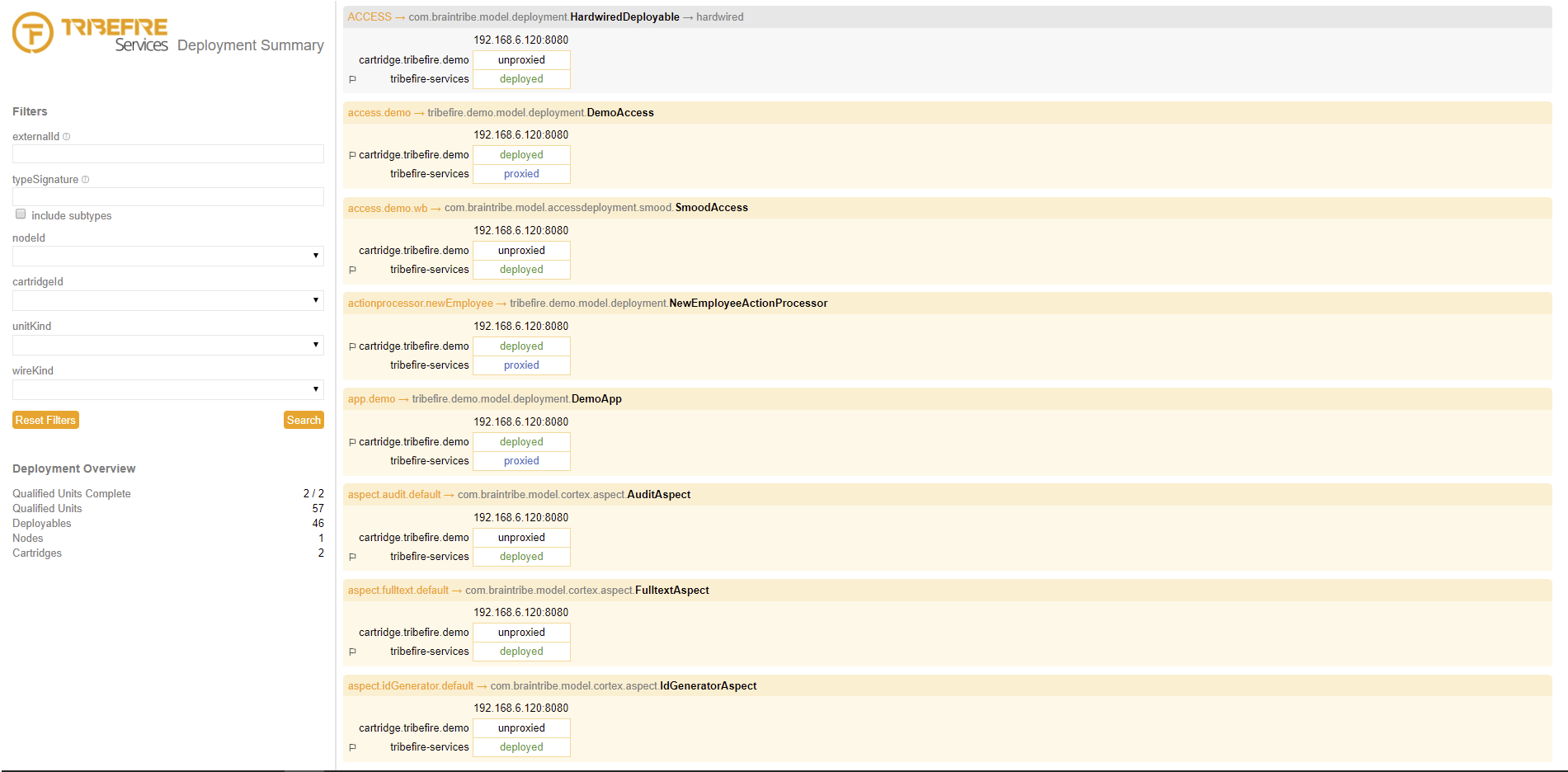Deployment Summary
Deployment Summary provides information about available deployables.
On this page
General
Deployment Summary provides an overview of the deployment status of deployables within a tribefire environment. Deployment Summary is accessible via a servlet listed on the tribefire services landing page as well as using an action in Control Center. Select one or multiple deployables and on the Action Bar, navigate to More -> Deployment Status, and select the Get deployment status action.

By default, Deployment Summary displays all available deployables.
Quantitative Overview
Deployment Summary also presents a quantitative overview of deployables using the following units:
| Unit | Description |
|---|---|
| Qualified Units Complete | The number of complete qualified unit instances. A qualified unit instance is defined as complete when all the responses from all InstanceIds (com.braintribe.model.service.api.InstanceId) are complete. In other words, the Multicast Request returns a success message each. |
| Qualified Units | The number of qualified units. A QualifiedUnit represents a reflected DeployedUnit (com.braintribe.model.deploymentreflection.DeployedUnit) on a specific InstanceId (com.braintribe.model.service.api.InstanceId). |
| Deployables | The number of Deployables from all cartridges and nodes. |
| Nodes | The number of nodes in the distributed system. |
| Cartridges | The number of cartridges in the distributed system. |
Filtering Results
The deployment summary page can display big amounts of data. You can filter the deployables by the following criteria:
| Filter | Description |
|---|---|
externalId | Filters by the externalId attribute. You can use specific and like searches to find your access, for example: - to search for concrete some.access, type some.access - to search for all deployables that end with access, type *access - to search for all deployables containing access, type *access* You can also search for multiple IDs by dividing them with a comma, for example, search for some.access,*cortex*,*workbench |
typeSignature | Filters by the type signature. You can use the simple name or the fully qualified name, for example, HardwiredAccess produces the same result as com.braintribe.model.accessdeployment.HardwiredAccess |
| include subtypes | Specifies whether to return subtypes of the specified type signature. |
nodeId | Filters by available nodes in the distributed tribefire environment. You can select one of the available options from the drop-down list. |
| cartridgeId | Filters by available cartridges in the distributed tribefire environment. You can select one of the available options from the drop-down list. |
unitKind | Filters by cartridge location. You can select one of the available options from the drop-down list: - Local: A DeployedUnit is defined as local, if its implementation is located in the current cartridge. - Proxy: A DeployedUnit is defined as a proxy, if its implementation is located in another cartridge. |
wireKind | Filters by the location of the deployable definition. You can select one of the available options from the drop-down list: - Dynamic: A dynamic Deployable is defined within an extension point (cartridge) and not wired into TFS. - Hardwired: A hardwired Deployable is defined in TFS configuration files directly, therefore automatically deployed (in contrast to Deployables deployable via Control Center) |
The different filtering options you apply are appended to the URL which allows for convenient reuse of the same filters.
Deployable View
The following information is displayed about each deployable:
- unit and wire kind information
- fully qualified name
- IP and cartridge the deployable originates from

- deployment status
The flag icon  specifies the cartridge the deployable originates from. A deployable can only be either deployed or undeployed in its cartridge of origin. All other cartridges per node can either have the deployable in a proxied or unproxied state. This depends on whether proxying is enabled.
specifies the cartridge the deployable originates from. A deployable can only be either deployed or undeployed in its cartridge of origin. All other cartridges per node can either have the deployable in a proxied or unproxied state. This depends on whether proxying is enabled.
| Status | Description |
|---|---|
| deployed | The deployable is successfully deployed. |
| proxied | The deployable is known by the cartridge - proxying for this component kind is enabled. |
| undeployed | The deployable is undeployed. |
| unproxied | The deployable is not known by the cartridge - proxying for this component kind is disabled. |
For information on how to enable proxying, see Developing Cartridges.
Deployment Status Detailed View
You can open the detailed view by clicking on the status of a deployable.
The detail view provides information on the wiring of the deployable’s components. The beanSpace::beanName information for the supplied implementation and the component binder is displayed. When you press the info icon the fully qualified beanSpace and an identity hint is displayed. The identity hint identifies the respective descriptor (hashCode). The DeployedComponent class provides more information on descriptors.